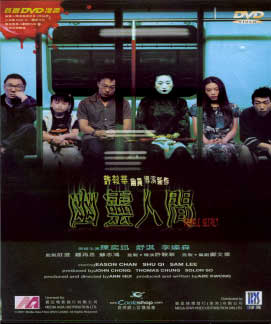Visible Secret

Director: Ann Hui
Year: 2001
Rating: 7.5
In the end the story
doesn’t add up and in truth it really doesn’t seem to mean very much – but
getting to that point of realization is an intriguing cinematic journey.
Director Ann Hui paints a visually stunning morose picture of Hong Kong
that is claustrophobic and creepily atmospheric. The city seems shrouded
in death, in nostalgia, in shadows, in questions. In ghosts. There are ghosts
everywhere. Hong Kong is a city of ghosts – living and dead.

Hui isn’t going for scares with this film – she is creating an atmosphere
of mystery, doubt and unease. What is real and what isn’t – what are dreams
and what isn’t - who is alive and who isn’t – who is what they appear
and who isn’t. Layers of uncertainty slowly emerge in the film as it almost
dissolves into a palette of muted surrealistic colors, of distorted nighttime
scenes and unnerving restricted space. The cinematography (Arthur Wong), the
set designs (Silver Cheung), the eerie music (Tommy Wai Kai Leung) all contributes
to a wonderfully seamless technical achievement. Simply watching this film
is a great pleasure from an aesthetic perspective. The story though
often feels like it is simply present as a clothesline to throw atmospherics
and flourishes around and when you are finished and examine what you have
witnessed there are gaping holes of logic that weaken the impact of the film
considerably.

The actors are almost overwhelmed by these atmospherics. They do a fine
job though with Eason Chan and Hsu Chi totally dominating the screen time.
This is one of Eason’s better jobs though in truth he need only go through
the film with an expression of confusion on his face. Hsu Chi’s role is much
more complex and fairly subtle as she morphs into various personas. She does
a solid job I thought with only a few momentary lapses into her girlish side.
And for those who appreciate her warbling ability you will be thrilled to
know that she once again sings karaoke! The supporting players do a terrific
job as well – James Wong is suitably weary for his character and Kara Hui
Ying Hung (in a rare dramatic role) is simply fabulous in her few minutes
on the screen as a possessed mother.

On the surface this film appears to be one of Ann Hui’s more commercial
efforts and fits in comfortably with the avalanche of horror films in Hong
Kong over the last couple of years. Hui is well known though for often creating
a political subtext within her films and though I am not entirely sure I
suspect that it is here as well. With the themes of loss of identity, loss
of memory, possession and losing ones head (literally) and the search for
it seem to open up the possibility that she is in truth visualizing a Hong
Kong going through an identity crisis and projecting her fears of a city
that will eventually lose it’s special heritage – its memories of what is
was. To Hui, Hong Kong is becoming a wandering ghost searching for its past.

Ghosts are everywhere and Hsu Chi can see them. One of her eyes has the
power of seeing them about the city. Not that she wants to – she usually
keeps that eye covered with either an eye patch or sunglasses – because they
frighten her – send her running in terror. Eason meets Hsu Chi in a disco
and they spend the night together. He begins to fall in love with her before
he realizes the strange life she leads. He is slowly sucked into it. His
father (James Wong) tells everyone that a ghost is possessing him but no
one will listen to him. Soon odd occurrences begin happening to Eason – his
apartment is painted red, dreams and reality start merging together, he wakes
up not knowing where he is, he starts seeing dead people too. Is this all
connected to Hsu Chi or rather to a horrible accident from years before in
which Anthony Wong loses his head. Hui takes her time in telling the story
– perhaps becoming too enamored with her sets and designs – but it is an
enticing tale until it falls short in the end.







